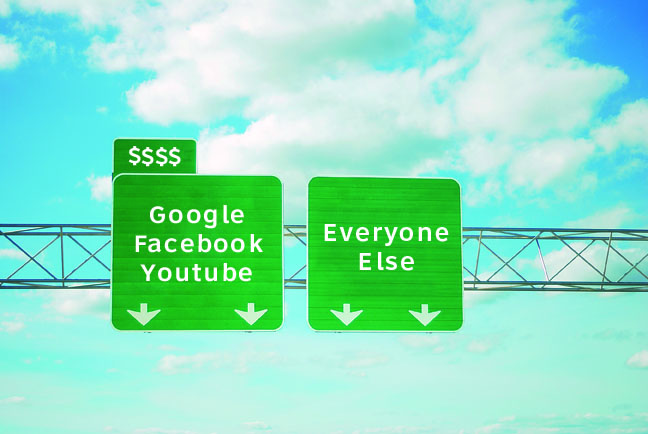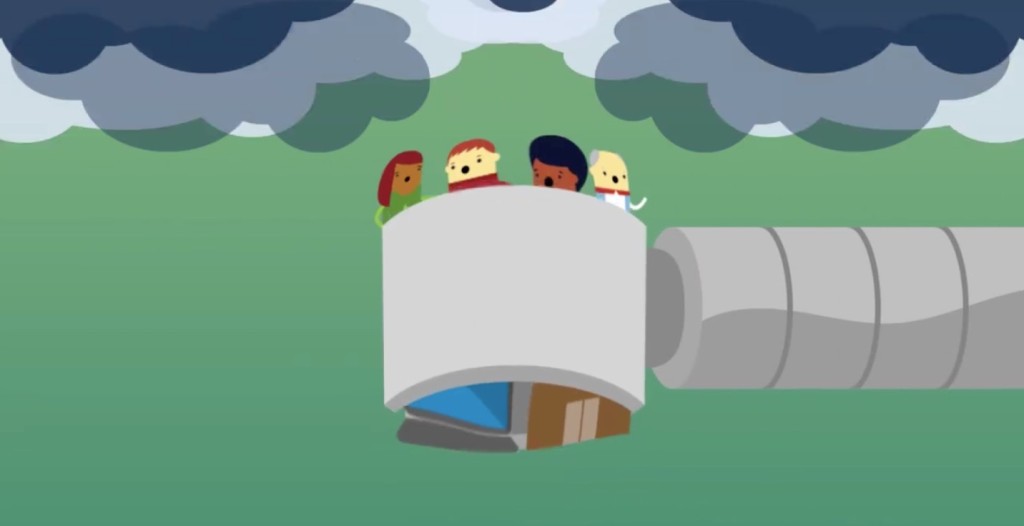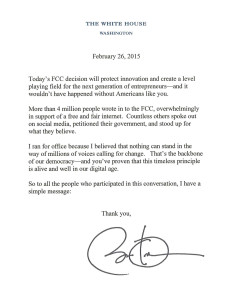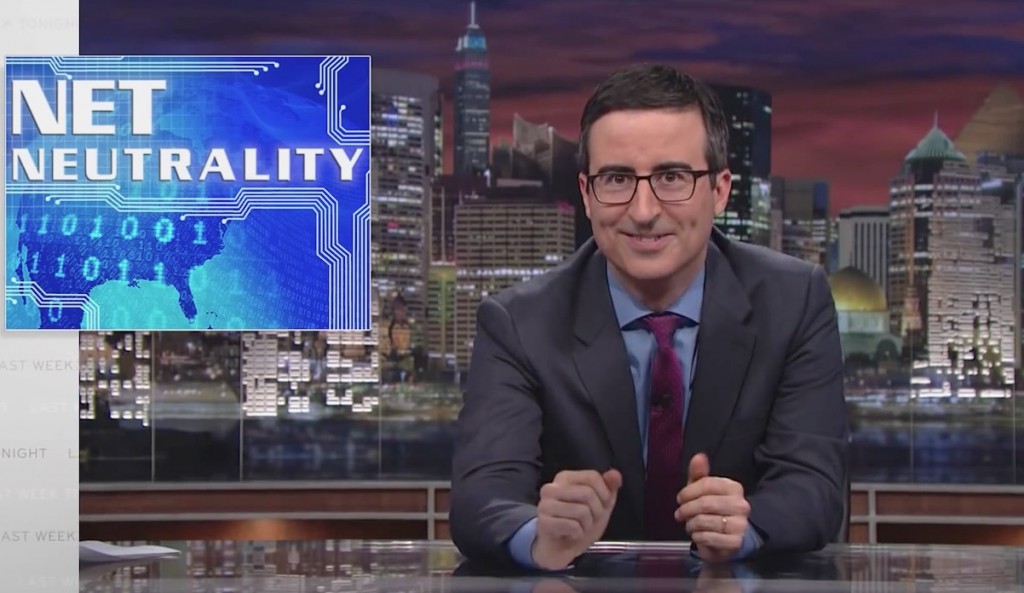Mobilization to orotect your internet rights starts today on April 4 – Antitrust Day
Spend 2 minutes to learn why net neutrality is more important than you think

Washington Post gives a neat synopsis of what The People stand to lose if Trump appointed Republican FCC Chairman Ajit Pai gets his wish and finds a way to reverse the Obama era protections establishing net neutrality, which WaPo defines as, “the regulations that forbid Internet providers from blocking or slowing Internet traffic.”
The rules, approved by the FCC during the Obama administration, classified Internet providers as “common carriers” — a move that allowed the agency to regulate those companies more strictly than before. In addition to banning the blocking or slowing of Internet traffic, the regulations also gave the FCC the ability to investigate business practices among Internet providers that it deemed potentially anticompetitive.
Supporters of the regulations argue that they are a vital consumer protection that prevents Internet providers from abusing their strategic position between Internet users and the rest of the Web. Without strong regulations, they say, Internet providers will be free to raise costs for consumers — such as charging customers extra to keep their personal data private, or to be able to view certain websites or use certain apps. Meanwhile, advocates say, ISPs could be allowed to charge website owners extra fees to reach consumers’ screens, and determine what apps and services may flourish online.
In 84 seconds learn why Cable & Telcos are trying to gut Net Neutrality funding and take it away from you

Fight for the Future cautions:
Net Neutrality is Under Attack. Don't let Congress break the Internet by dismantling Net Neutrality — share this video to raise the alarm.
Why not also call your elected federal officials and ask them to protect net neutrality on your behalf? Calling is a powerful action to make sure net neutrality doesn’t go away. Call using this convenient tool.

The White House defines net neutrality:
More than any other invention of our time, the Internet has unlocked possibilities we could just barely imagine a generation ago. And here’s a big reason we’ve seen such incredible growth and innovation: Most Internet providers have treated Internet traffic equally. That’s a principle known as “net neutrality” — and it says that an entrepreneur’s fledgling company should have the same chance to succeed as established corporations, and that access to a high school student’s blog shouldn’t be unfairly slowed down to make way for advertisers with more money.
Has Facebook stepped up censorship?
 This a new level of censorship. Cut it out, guys
This a new level of censorship. Cut it out, guys 
Haven’t you heard – Net neutrality is now law in the United States?
OK John Oliver, I made my comment to the FCC on net neutrality. Happy now?
 I’ve made comments to the FCC about net neutrality in previous comment periods but not this one. Enter John Oliver, who made such a convincing argument about the need to take advantage of our bloody rights as US citizen to make a positive difference in this matter, that I felt shamed enough to submit another comment today.
I’ve made comments to the FCC about net neutrality in previous comment periods but not this one. Enter John Oliver, who made such a convincing argument about the need to take advantage of our bloody rights as US citizen to make a positive difference in this matter, that I felt shamed enough to submit another comment today.
If you too wish to be motivated to get off YouTube, Facebook or whatever you’re on for a while and use your computer for the God-given purpose it was clearly designed for (that is: the protection and furtherance of global democracy) then you too NEED to watch John Oliver’s segment on Last Week Tonight about Net Neutrality. Go on, I dare you to watch and come away uninspired.
I hope you’re happy now @iamjohnoliver and you’ll stop implying that I would be stupid and sleazy – not to mention lazy – to not fulfill my democratic obligation by making this comment. Granted, the topic is an issue that I care more about than almost any other matter besides eating and my family. But name-calling to motivate me to take an almost sinfully easy action to protect my rights? Well, that was an extremely low blow, even if an utterly effective one.
FYI, this is my comment:
14-28 Protecting and Promoting the Open Internet:
My college students sons and I believe in net neutrality, and we want it for all the good it provides us: information access, easy and open communication, streaming videos & movies, activism portal, access to the knowledge of the world!, translations. The internet was built with funds from users. I’m a user, my sons are users … everybody’s a user. Companies that provide point of access do not have the right to limit our access in any way. Do the right thing for the people, not for the corporations trying to dominate and control our lives. Use Title II to protect the open internet and net neutrality for all. Forever!
This is where you go to enter a comment to the FCC of your own: fcc.gov/comments.
And then if you were feeling super-motivated, you might amble over to Battle for the Net and use their easy tool to write and call your congressman and senators to tell them that Net Neutrality’s important to you. You could even send another one here. Why stop when you’re on a role?
Save the free internet hashtag #stfi
Take a look at
http://thewei.com/kimi/we-must-keep-the-internet-open/
http://thewei.com/kimi/fight-for-internet-freedom-and-the-open-web/
Electronic Frontier Foundation
Save the Internet, a Free Press initiative
epic.org
National Urban League supports the open internet
President Obama supports an open internet
Speed Matters (universal broadband support org)
Broadband Opportunity Coalition
‘Barbershop Punk’ documentary explains Net Neutrality and issues
“Barbershop Punk,” a David-and-Goliath style documentary about Net Neutrality and citizen’s rights to the Internet has been touring the film festival scene and on Friday night — a day after the Senate voted to strike down a move to block the FCC’s net neutrality rules . . . Small audience by small audience, the film — which includes interviews with Henry Rollins, OK Go’s Damian Kulash, Clinton White House Press Secretary Mike McCurry and FCC Commissioner Jonathan Adelstein, among others — is educating viewers . . .
Its title refers to the punk sensibility of questioning the status quo and to Robb Topolski, a software engineer and fan of barbershop quartet music who noticed, while trying to share turn-of-the-century barbershop recordings online that his Comcast service slowed down each time. It was Topolski’s methodical research into the service weirdness, followed by an AP story, that brought the Net Neutrality issue to nation’s attention.
Two ideas have stayed with me since the viewing. The first was that the Internet originally followed “common carriage laws,” which were developed with the nation’s postal service and meant that the post office couldn’t read your letter and then decide if it wanted to send it — if you paid for a stamp, it mailed your letter regardless of its content. Eventually, though, Internet traffic grew, and became increasingly lucrative, and the FCC was convinced that the Internet is a different animal and shouldn’t be subject to common carriage, which is very loosely the net neutrality argument in a nutshell: The ISPs believe they own the networks and should be able to read your digital bits and bytes before sending them on, while other people believe the Internet belongs to everyone and should remain open.

